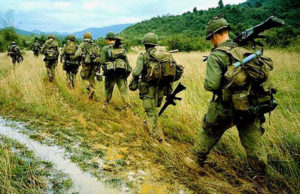I don’t believe it’s an overstatement to call Ken Burns and Lynn Novick’s upcoming PBS documentary special a “landmark television event.”
They’re going to chronicle an event that shaped a generation of Americans. It made a lot of young Americans grow up in a major hurry. “The Vietnam War” airs beginning Sept. 17 over 10 days; it comprises 18 hours of viewing.
Burns told AARP magazine: “We have a kind of historical amnesia about Vietnam.” He said it is “like an amputated limb that still itches, still aches. If we as Americans want to get over the divisions we feel today so prominently, it’s important to understand the place where they began.”
AARP calls Burns and Novick’s project a “doozy.” Boy, howdy. Is it ever.
***
Millions of Americans are going to watch this event with a special interest. These are those who reported for duty at some time during the Vietnam War. They were affected by it openly and viscerally. The war brought them pain, which many of them brought home with them.
I was fortunate in that regard. I didn’t suffer physical pain as a result of my service there. I’ve noted already that I was what grunts called a REMF, a “rear-echelon motherf*****.” I worked on Army airplanes and later scrambled missions at the I Corps Tactical Ops Center in Da Nang.
But in November 1989, I had the rare honor of returning to Vietnam, 20 years after I reported for duty at Marble Mountain. I went back to Marble Mountain at the tail end of a three-week fact-finding trip I took with 20 other journalists, members of the National Conference of Editorial Writers. We toured Cambodia, Thailand and Vietnam. At the end of that “official” journey,” two colleagues and I flew north from Saigon to Da Nang as part of a personal sojourn.
We arrived in Da Nang and then took a car out to Marble Mountain. We strolled along the sandy terrain where I had walked as a young soldier. Our guide was explaining to us how the Vietnamese had absorbed our physical presence at Marble Mountain, how they had taken possession of all we had left behind. They put it to use for their own purposes, she said.
That’s when it happened. I broke down in tears. I began sobbing. I cried like a little child. Our guide, Mai, stopped talking. My friends backed away. I was alone with my emotions for, oh, just a few moments. Then it stopped. I wiped the tears off my face. Took a deep breath.
At that moment, I was cleansed of some unknown pain. I felt a sense of relief. I had shed a load of emotional baggage I never even knew I had been lugging around since my departure from the war zone two decades earlier.
I was a happy man. That “amputated limb” no longer “aches.”
I have told Vietnam veterans since my return from that marvelous journey that they, too, need to return. I get mixed reactions from them. I don’t press the issue; it’s for them to decide.
Ken Burns is an acclaimed documentary filmmaker with a huge body of work that’s been broadcast for decades on PBS. His collaboration with Novick is highly anticipated.
It will be a landmark event. I also am quite certain a lot of Vietnam vets will learn something about a critical chapter in their lives. They also might learn something about themselves.
Does it get any better than that?
